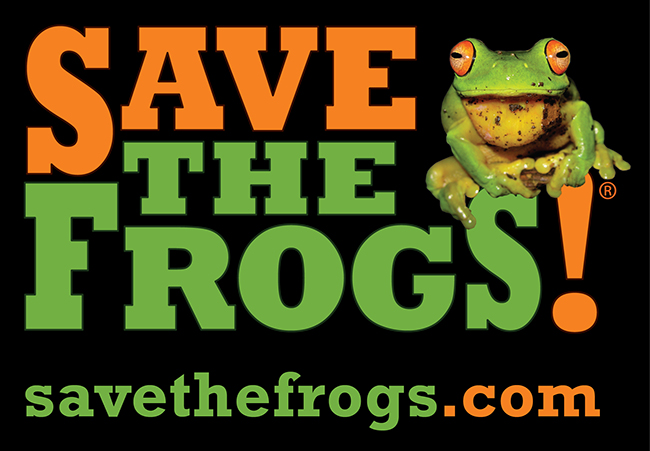SAVE THE FROGS!
World Summit Online 2022
In an effort to spread the amphibian conservation knowledge far and wide, SAVE THE FROGS! organized the 2022 SAVE THE FROGS! World Summit Online, which brought together amphibian conservation experts from around the world. The event took place April 6th & 7th, 2022 as a lead up to the 14th Annual Save The Frogs Day.
The 2022 SAVE THE FROGS! World Summit Online was a huge success, with 15 speakers, 7 hours of presentations and 413 registrants representing over 50 countries. As with all previous World Summits, the event was free for all to attend.
The World Summit took place April 6th & 7th, 2022.
“Enjoying the World Summit! Amazing information from people all over the world!”
— Lora Kemp, World Summit Participant
Schedule Of Events
All Times Are Listed in US Pacific Timezone (Los Angeles)
Dr. Kerry Kriger
April 6th: 11:00-11:15am
Welcome to the SAVE THE FROGS! World Summit
SAVE THE FROGS! Founder Dr. Kriger will give a brief overview of the 2022 SAVE THE FROGS! World Summit Online and lead a worldwide frog chorus to kick off the amphibious festivities.
Rob Grasso
April 6th: 11:15am-12:00pm
The Imperiled But Recovering Amphibians Of Yosemite National Park, USA
Amphibians are rapidly declining around the world, and even in protected places like the Sierra Nevada Mountains and Yosemite National Park, USA that these fascinating creatures call home. Come learn about our amphibian diversity, the problems our amphibians face and what park managers and researchers are doing to stop the decline.
Tom Biebighauser
April 6th: 12:00-12:45pm
Vernal Pool Development and Restoration
Vernal pools provide critical breeding habitat to frogs, toads, and salamanders across North America. Unfortunately, a majority of these ephemeral wetlands have been lost to draining and filling for agriculture, and to urban development. The destruction of these vernal pools is affecting recovery efforts for listed species of amphibians, crustaceans, and shorebirds. Tom Biebighauser will talk about some of the highly successful techniques he has developed for restoring vernal pools that look and function like natural wetlands. You’ll meet dedicated individuals across the United States and Canada who are building vernal pools to provide habitat for rare species at schools, on rangeland, in forests, fields, and on mined land. It is now entirely possible for landowners to build vernal pool, and at a low cost!
Arturo Munoz
April 6th: 12:45-1:30pm
Ecology & Conservation Of The Bolivian Water Frogs (Telmatobius)
The water frogs of the genus Telmatobius are a group of aquatic and semi-aquatic amphibians found throughout the Andes Mountains, from Ecuador through to Chile and Argentina. Due to the highly restricted ranges of many of the species, alongside the impacts of human exploitation and habitat disturbance, 54 of the 63 Telmatobius species are classified as threatened by the IUCN Red List. Bolivia alone houses fourteen Telmatobius species, all of which are threatened and thirteen of which are endemic to the nation. However, very little is known about the geographic distribution, natural history or conservation status of the majority of Bolivian Telmatobius species, with several known only from museum specimens collected during their initial observation.
Over the past decade, research and conservation efforts focusing on three Bolivian Telmatobius species (the Titicaca, Sehuencas and Sucre water frogs) have revealed rapid declines in their population sizes, leading to serious concern about their chances of persistence. Here, we share some examples of what has been done to better understand and protect these three species, information that will prove imperative for the prioritization of future research and conservation actions. We aim to demonstrate how we are working to guarantee a more effective allocation of efforts and resources for the conservation of these species and share a couple of case studies that showcase both the successes and failures of amphibian conservation.
Julio San Martín
April 6th: 1:30pm-1:45pm
Chilean Amphibians, Their Parasites And Other Symbiotes
This presentation will be about the state of Chilean amphibians and their parasitic and other symbiotic relationships; and the importance regarding the biodiversity conservation of both hosts and symbionts in the context of a One Health vision.
Steve Andrews
April 6th: 1:45pm-2:00pm
A Frog Poem & Songs About Saving Nature
I will read my poem “Death of The Frog Buddhas,” and perform my songs “Where Does All The Plastic Go?” “The Nightingale,” and “Time For Ocean Aid.”
Dr. Kerry Kriger
April 6th: 3:15-3:45pm
Q & A with Dr. Kerry Kriger
SAVE THE FROGS! Founder Dr. Kerry Kriger will answer an array of questions he has received covering a wide spectrum of amphibian conservation issues, and will be available to answer your questions as well.
Margot Fass
April 6th: 3:45-4:00pm
Twelve Years of Swimming And Hopping Along With SAVE THE FROGS!
If I can do it, so can you! Starting out as a complete neophyte in the world of environmentalism, although embracing the concepts, gradually I have given over more and more of my day job time as a psychiatrist to my own frog program, Frog House Project, Inc (aka A Frog House), a 501(c)(3) public charity located in Pittsford, NY. Although not yet self sustaining, we are becoming more known, more popular, more active, and now, with the excellent guidance over the years of Kerry Kriger, Ph.D., we are expecting 2022 to be our year of making a real difference for frogs. Dr. Kriger never pushes, never shoves, but follows his students’ lead and responds to each where they are, with an ability to allow the best of them to manifest. He is a teacher par excellence. In a hopefully amusing but definitely step by step fashion, I hope to inspire you to move along at your own pace to do everything you can to save the frogs and for SAVE THE FROGS!
Razzaq Sarker
April 6th: 4:00-4:30pm
Acoustic Monitoring Of Frog Populations: Understanding Responses To Changes In River Flow
River regulation has negatively affected biodiversity by altering flow regimes and degrading floodplain wetlands. Semi-aquatic species such as frogs have been affected by the alteration of hydrological connectivity and inundation in floodplain wetlands because hydrological regimes are important for their occurrence and breeding. Monitoring ecological responses is thus important to improve water management plans in river system (floodplain wetlands) for the benefit of wetland-dependent biota, especially sensitive species like frogs. Frogs are highly vocal in floodplain wetlands, and a range of environmental factors, such as season, temperature, rainfall, and inundation influence frog calling activity. Frog chorusing activity is an indicator of potential breeding, and so provides essential insight to understand community responses to flow. However, gaining a better understanding on frog chorusing activity in response to inundation is essential to managing environmental water delivery and conserving frog populations in floodplain wetlands in semi-arid regions in Australia.
The aim of my study was to understand the variation in overnight continuous chorusing activity of different frog species before and after an inundation event following environmental flow by using passive acoustic monitoring. This method is effective for remotely monitoring vocal animals continuously and collecting long-duration acoustic data in multiple areas simultaneously. I used this monitoring method specifically to explore nightly variations in chorusing activity of the frog communities before and after the arrival of two different flow events. I also tested how daily minimum temperature and rainfall affect nightly chorusing activity. In my presentation I will be talking about how we can monitor frog populations using passive acoustic recorders and analyze large acoustic datasets that allow researchers to study frog responses to environmental change over larger scales.
Krishan Kumar Sharma
April 6th: 8:45-9:00pm
The Impact Of War On Biodiversity, With Particular Reference To Frogs
It took millions of years for the Planet Earth to come into present shape with its beautiful diversity of organisms, all linked together through the food web. Their habitats are defined by where they live comfortably, but evolution created a species called Homo sapiens that is encroaching on all the available habitats on earth. Biodiversity is facing several challenges for its survival due to natural reasons as well as many anthropogenic activities of humans. Small creatures, burrowing or living nearby small water bodies face several threats of survival, especially frogs.
To the best of my knowledge and literature available, there is no documentation on how many species have been killed in wars. Our beautiful earth has faced two such incidents (World War I and II). Even after knowing the consequences, many countries are still involved in war, using missiles, grenades, high power explosives in all the three major habitats (land, water and air). Once conflict is over, they decide the loss of buildings, humans, and commercial establishments, but never how much biodiversity has been lost. I would like to attract attention of the world, how many frogs and other amphibians have been lost in war. How can we stop such brutal activity on our frogs killed during wars? And what penalties can be imposed on the alleged nations who have destroyed creatures in war?
Andrie Bon Flores
April 6th: 9:00-9:15pm
Field Techniques in Frog Survey and Assessment
Field surveys done by field scientists are among the first steps in biodiversity conservation. In this presentation you will get to know more about how frog biologists do field surveys, and the techniques and methods used in amphibian sampling and assessment. My presentation will include a little background on frogs, where to find them, the materials needed, sampling techniques, proper handling of frogs, morphometrics, measuring frogs, microhabitat assessment, sampling effort, field guides and notes on identification. Be inspired and motivated for the fun in the wild that awaits you when you survey!
Andrie Bon Flores
April 6th: 9:15-9:30pm
Status and Challenges in Philippine Amphibian Diversity and Conservation
Amphibians play an integral part in the ecosystem as primary consumers of insects, prey for birds, mammals and other predators. They are also considered one of the most effective indicators of ecological health. The Philippines is considered to be one of the megadiverse countries in the world and one of the most important centers of amphibian species in Southeast Asia. Amphibians have the highest percentage of endemicity as compared to other animal taxa in the country. Philippines is indeed a great place for different species of frogs given that it is the world’s second largest archipelago and harbors many species that are island-restricted. With the current updates of frog research in the country, continuous discovery of new species, updating of data and rediscovery of frogs have been conducted in the different parts of the Philippines. This is in order to protect our treasure trove biodiversity and the habitats that they live in.
However, the Philippines have a high level of threatened species in the area. Threats to amphibians are due to anthropogenic activities such as slash and burn, illegal logging, agricultural expansion, pollution, infrastructure development, hunting, introduction of invasive species and even mining. They are also less mobile, have smaller home ranges, and thus may be affected with a greater mark through alteration of their habitat. These threats make many of the species vulnerable to extinction. This presentation aims to detail the threats and garner appreciation for the Philippine Amphibian Diversity.
Paul Morton
April 7th: 8:45-9:00am
Bug Belly The Hungry Frog, In Pictures And Words
A break from the ‘serious’ stuff. I will read a short extract and show illustrations from my early reader children’s books about Bug Belly the Hungry Frog. In addition I can share some of the many FREE froggy resources that I have created both to support Bug Belly and to help spread the fostering of love and interest in frogs to children across the world.
Chris Berry
April 7th: 9:00-9:30am
California Reg-Legged Frog Conservation Planning in Santa Cruz - Recovery is Possible!
The City of Santa Cruz has recently completed a federal Endangered Species Act Section 10(a)(1)(B) permit and associated Habitat Conservation Plan (HCP) that includes, among other species, the California Red-Legged Frog (Rana draytonii, CRLF). While this has presented some significant operational and water supply challenges to the City, protection of the State of California’s official state amphibian is well-aligned with the City’s overall conservation ethic. In this presentation, City of Santa Cruz Watershed Manager, Chris Berry, will be discussing the 20+ year path toward completion of the HCP, its future implementation and what that means for the future of CRLF, as well as lessons learned during this long term conservation effort.
Luis Castillo
April 7th: 9:30-9:45am
The Frog Guardians of Lake Chinchaycocha in Junín National Reserve
This project will contribute to the conservation of two endangered amphibians endemic to the Lake Junin watershed: The Lake Junin frog (Telmatobius macrostomus) and the Junin riparian frog (Telmatobius brachydactylus) through the participation and empowerment of local people. Denver Zoo and our key partners GRUPO RANA (an NGO) and Junin National Reserve (a protected area) will support agrarian communities’ vision that in order to recover the populations of these species, it is first necessary to protect them and then to recover and maintain their healthy habitat. Specifically, we will generate capacities and skills in volunteer Community Park Rangers of the Junin National Reserve as part of a frog population and habitat monitoring and restoration program. We will use this information to maintain healthy populations and habitats of these two species of frogs. This project will build community capacity to empower local people to have direct, positive impact on a species of concern and value to them. It will provide self-sustaining opportunities through the long-term commitment of key organizations.
Justin Mosley
April 7th: 9:45-10:00am
Frogman & The LoveByrds
Performing original music & covers about the environment. Always believing that the power of music can be used to connect & heal.
Dr. Kerry Kriger
April 7th: 10:00-10:15am
SAVE THE FROGS! Grants Winners Announced
SAVE THE FROGS! Founder Dr. Kerry Kriger will announce the winners of the most recent round of SAVE THE FROGS! Grants. Since 2009, SAVE THE FROGS! has disbursed $101,398 in grants, to 47 amphibian conservationists in 16 countries. We send a big thank you to everyone who has ever donated to SAVE THE FROGS! and made these awards possible.
Dr. Kerry Kriger
April 7th: 10:15-10:30am
Q & A with Dr. Kerry Kriger (Part 2)
SAVE THE FROGS! Founder Dr. Kerry Kriger will answer an array of questions he has received covering a wide spectrum of amphibian conservation issues, and will be available to answer your questions as well.
Sarbani Nag
April 7th: 10:30-10:45am
SAVE THE FROGS! India - Spreading Amphibian Awareness Throughout The Subcontinent
SAVE THE FROGS! India is a registered trust under the Government of India and is dedicated towards the conservation of amphibians across India. As the organization’s Founder & Director, I will discuss our efforts to raise awareness of the least-talked and non-charismatic group – Amphibians. I’ll also be talking about how we have involved common people in conservation and our future plans to promote citizen science as a tool of saving Amphibians. In India, most funded species are the big cats, elephant, rhino. Prospect of funding research to know more about amphibian ecology is poor and so is the job security. Motivating students to take up amphibian research is another challenge and l’ll be talking about this as well. With these, I will also discuss our mission, vision and future program plans.
Dr. Kerry Kriger
April 7th: 10:45-11:00am
An Amphibious Closing Ceremony
SAVE THE FROGS! Founder Dr. Kerry Kriger will close out the 2021 World Summit Online with some final thoughts and a summary of important insights gained over the past 24 hours.
And now...
Meet the Presenters
We are pleased to bring together the following amphibian biologists and environmental conservationists, to raise awareness for endangered amphibians and provide you with numerous ways you can assist threatened wildlife and ecosystems in your own community
Dr. Kerry Kriger
SAVE THE FROGS! Founder, Executive Director, Ecologist & Webmaster
USA
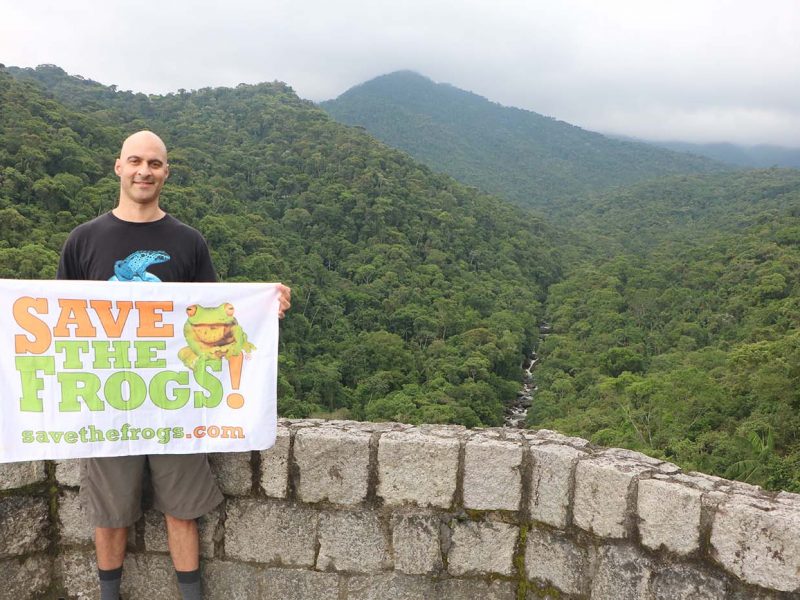
Dr. Kerry Kriger is the Founder & Executive Director of SAVE THE FROGS!, a nonprofit organization dedicated to protecting amphibian populations. Dr. Kriger has given over 400 presentations on amphibian conservation in 19 countries. Under his leadership, SAVE THE FROGS! has protected, restored and created habitat for endangered amphibians; successfully campaigned for city, county, state and federal legislation to protect amphibians; and coordinated over 2,000 educational events in 62 countries.
Dr. Kriger holds a Ph.D. in Environmental Science from Griffith University in Gold Coast, Australia, and a Bachelor of Science degree in Mechanical Engineering from the University of Virginia in Charlottesville, VA. He is a recognized expert on the amphibian disease chytridiomycosis, a topic on which he has published 20+ articles in peer-reviewed international scientific journals. Dr. Kriger’s amphibian conservation efforts have been supported by the National Geographic Society, the Disney Worldwide Conservation Fund, Patagonia and various philanthropic organizations throughout the world.
Dr. Kriger is also the Founder of Bansuri Bliss, through which he has taught hundreds of students the intricacies of the bansuri (bamboo flute) and the classical music of northern India.
He is also the Founder of Nonprofit ICU, a platform dedicated to helping nonprofit founders, executive directors and board members, start, manage and grow their nonprofit organizations.
Tom Biebighauser
Wetland Restoration and Training LLC
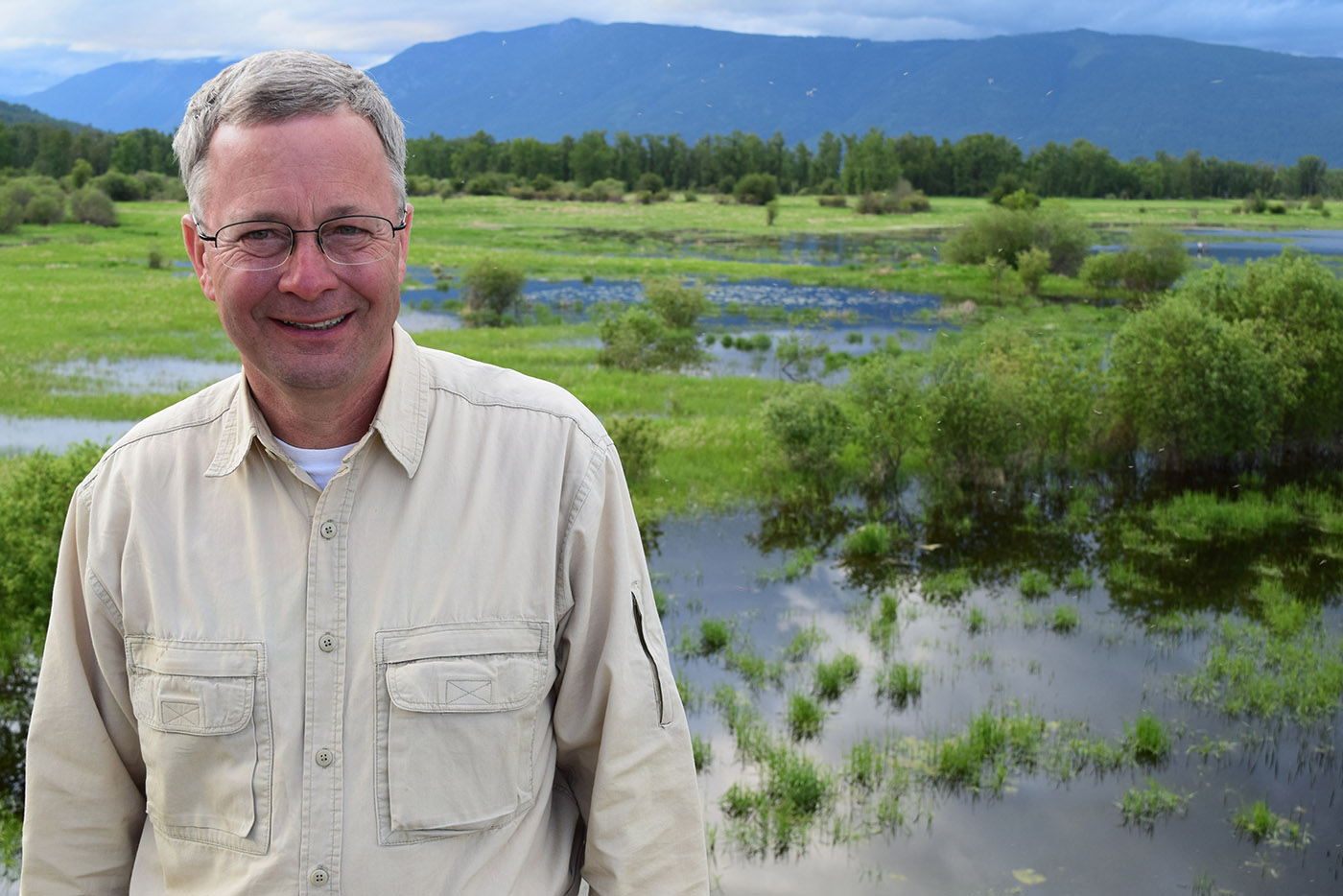
Tom Biebighauser has restored over 2,700 wetlands and streams across Canada, in 26 states, New Zealand, Puerto Rico, and Taiwan since 1979. Tom designs and builds over 120 wetlands and streams each year. He has developed highly effective techniques for restoring springs to provide habitat for endangered animals and plants. Having built over 1,400 dams, he has since decommissioned over 300 dams. He retired in 2013 after working 34 years for the US Forest Service as a Wildlife Biologist, where he initiated wetland and stream restoration programs across the United States. Tom has served as an instructor for the British Columbia Wildlife Federation Wetlands Institute for 17 years, restoring over 250 wetlands and streams across Alberta and British Columbia since 2003. He instructs a Graduate-level class on Wetland Design for Engineers at the University of Louisville Speed School of Engineering, along with classes for the British Columbia Institute Technology. Tom has developed highly effective and low-cost techniques for building wetlands and streams for rare species across North America. The habitats he builds require little, if any maintenance, and do not involve the use of diversions, dams, dikes, pipes, or pumps. Tom has written 4 books about wetland restoration, and has received 44 awards for his outstanding contributions.
Rob Grasso
Yosemite National Park - National Park Service
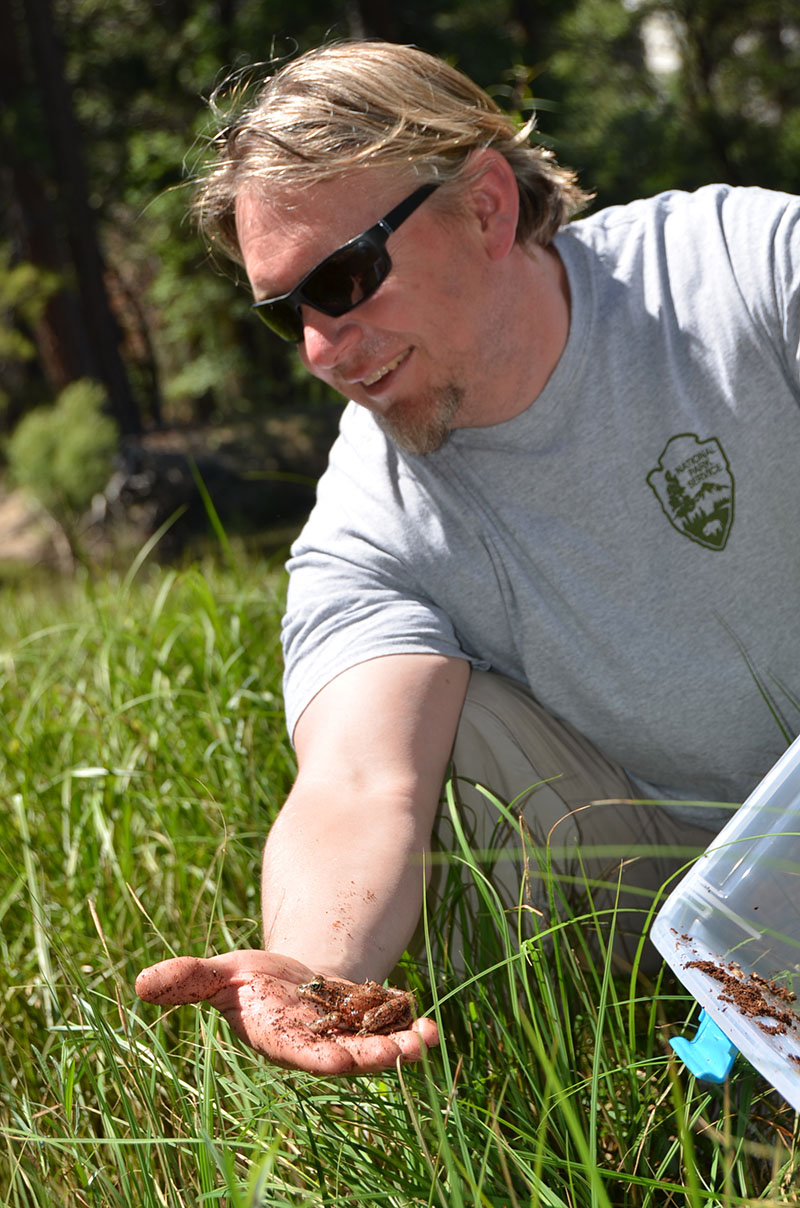
Rob Grasso has been studying amphibian declines in the Sierra Nevada Mountains for 20 years and now works as the Aquatic Ecologist in Yosemite National Park protecting and preserving the parks aquatic biodiversity.
Chris Berry
City of Santa Cruz, California
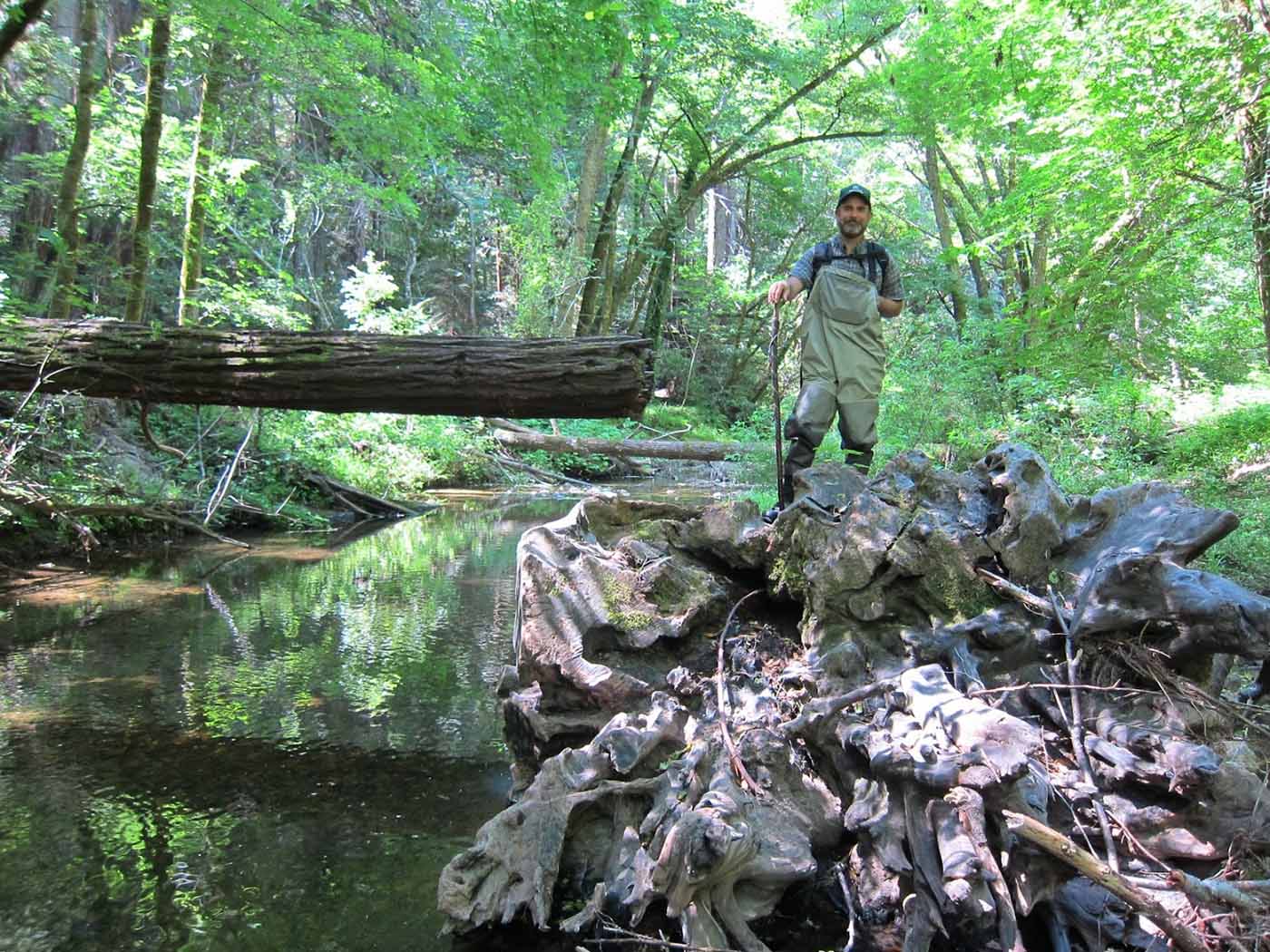
Chris Berry is an environmental protection professional with 37 years of experience in the government, NGO and private sectors. His academic work focused on aquatic biology and non-point source water pollution management at the University of California – Santa Barbara and the University of San Francisco, respectively. During the past 27 years he has been primarily focused on California Department of Fish and Game Code, Federal Safe Drinking Water Act and Endangered Species Act compliance support for the City of Santa Cruz, California. During that time he either initiated or completed and began implementation of three Habitat Conservation Plans for a diversity of species ranging from coho salmon to the Mount Hermon June Beetle, while also being engaged in open space and recreation management, environmental education program development and oversight, water rights and Integrated Pest Management program administration and related matters.
Other related experience includes chairing the Coastal Watershed Council Board of Directors, the County of Santa Cruz Fish and Wildlife, Water and Environmental Health Appeals Commissions, and serving on the SAVE THE FROGS! Advisory Committee. Activities in these positions has included, among others, groundwater management, drought response planning, anadromous salmonid recovery and invasive species, karst protection zone, recreational fishery, commercial cannabis cultivation and riparian protection policy-making.
Sarbani Nag
SAVE THE FROGS! India
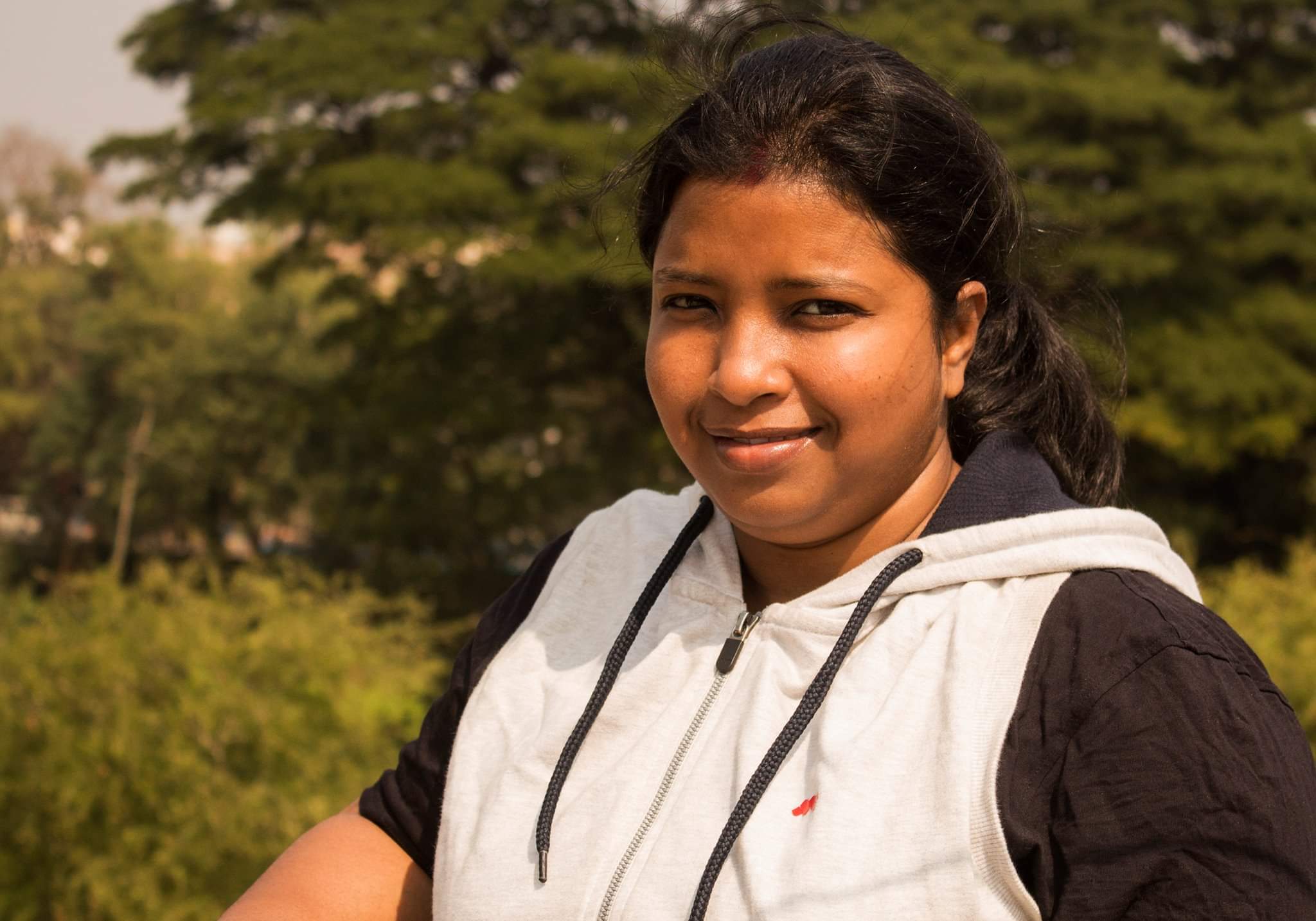
Sarbani Deb (Nag) is a naturalist whose love for nature had led her to step into the world of nature-conservation and wildlife research. Sarbani did her M.Sc. in Zoology from University of Calcutta and went exploring the wild wild outdoors of India to get a first-hand experience. Her area of specialization is herpetology, the study of reptiles and amphibians. From the Sikkim Himalayas (ATREE project) to the wilderness of Dehradun (for Wildlife Institute of India) and salamander research in Darjeeling, West Bengal — her thirst for knowing about India’s rich biodiversity took her to different places. Her education made her realize that there is a gap between research and implementation of the data for actually conservation in India. That’s when she founded WISH Foundation, a Kolkata-based NGO that works towards community sensitization and capacity building for a more responsible future. Her love for amphibians has inspired her to take the responsibility of registering SAVE THE FROGS! India trust, dedicated towards saving amphibians across the country. When not out in the wild or neck-deep in her research work, she can be found doing her riyaaz in Indian classical music.
Arturo Munoz
Ghent University, Belgium
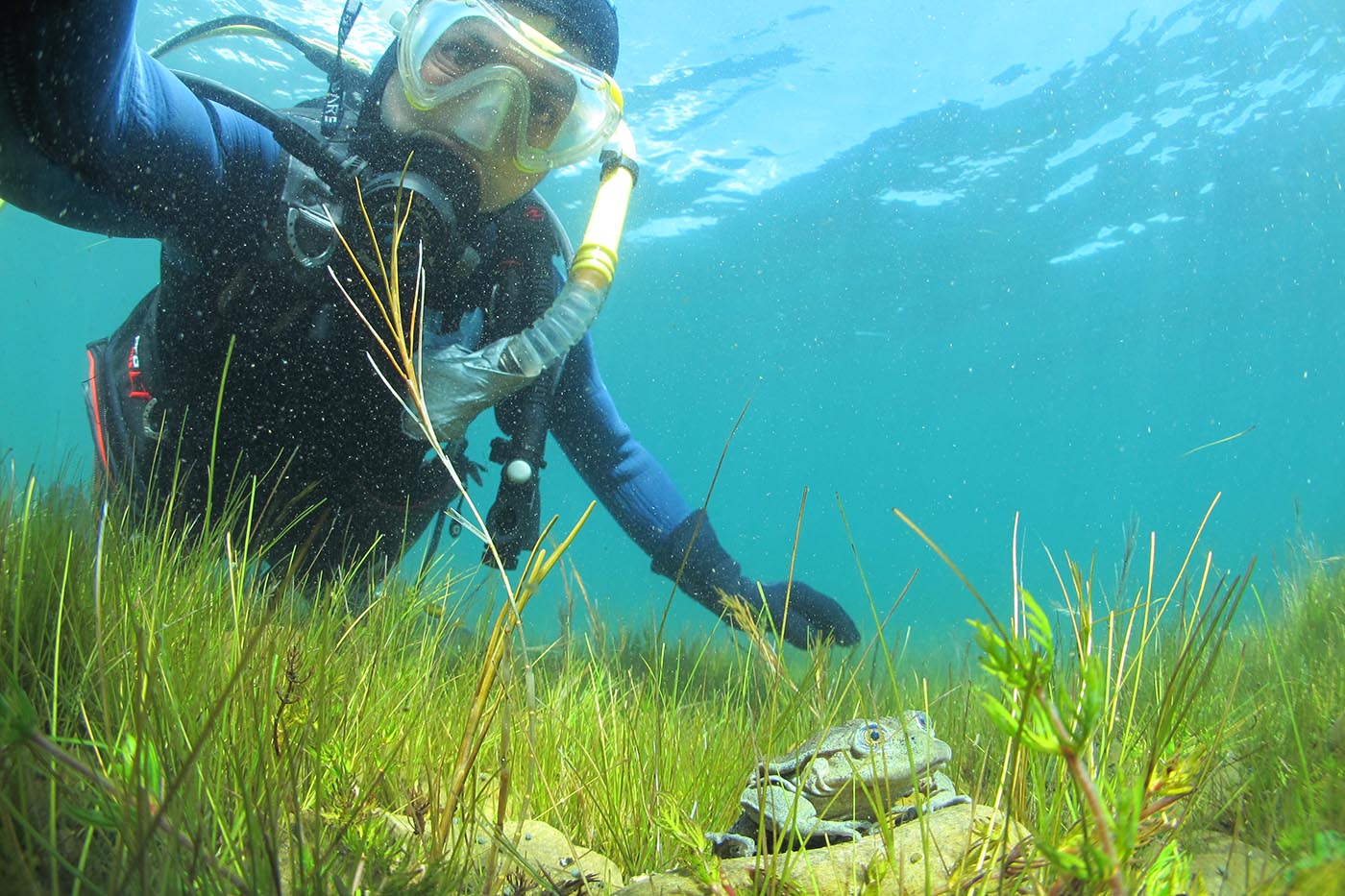
Arturo Munoz is a Bolivian biologist who has worked with amphibians and reptiles since 1998. After carrying out amphibian assessments throughout Bolivia for more than five years, Arturo founded the Bolivian Amphibian Initiative in 2007, a project aiming to conserve the nation’s native amphibians. Since then, his research has focused on High Andean amphibians, including the Water Frogs of the genus Telmatobius. Arturo has been monitoring the Titicaca water frog (T. culeus) within its natural habitat since 2008 and established the world’s first captive breeding program for the species. Currently, he is working to support and carry out studies focusing on a variety of different species within the Bolivian Andes, as well as being a proponent of conservation throughout Bolivia.
Julio San-Martín-Órdenes
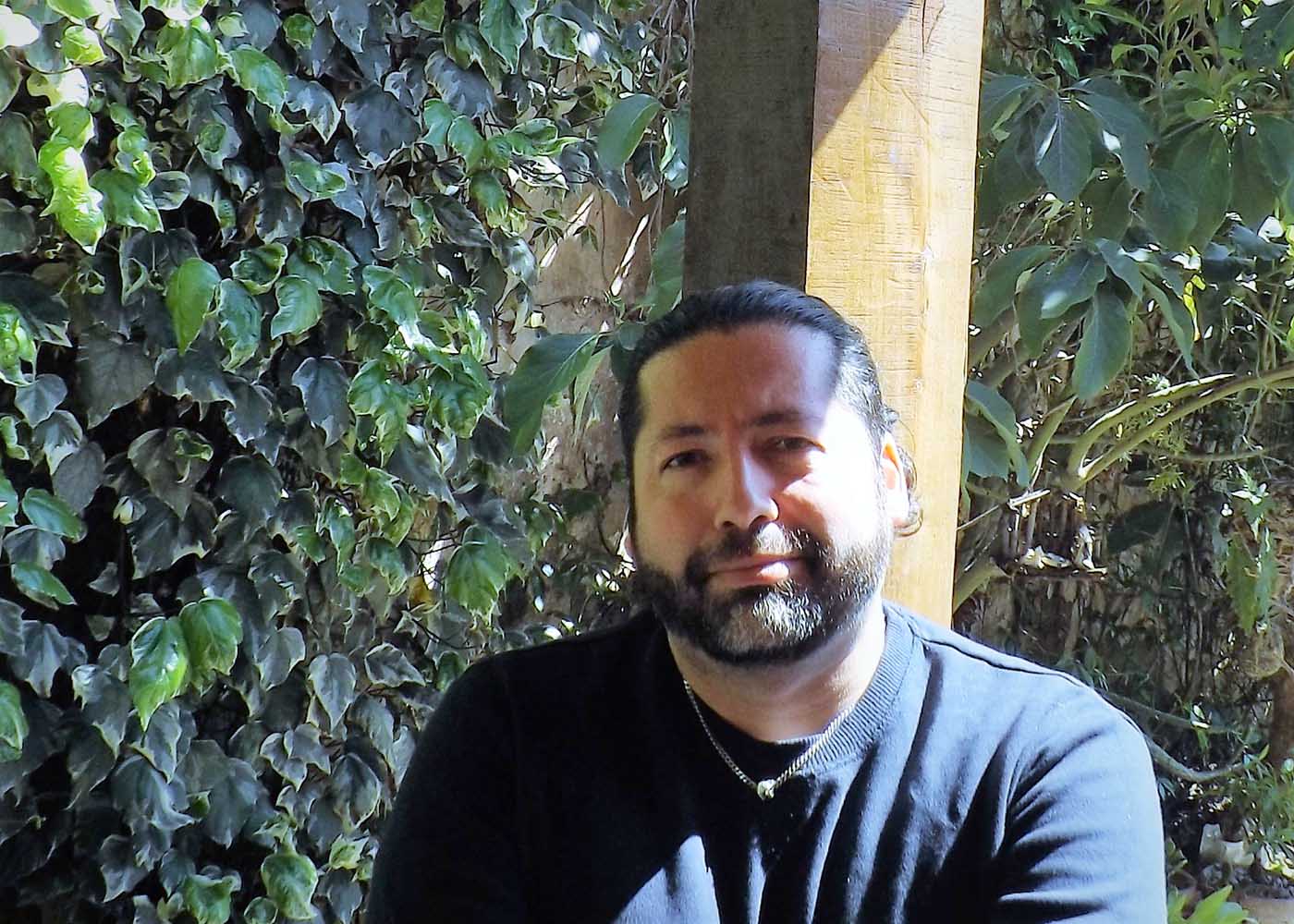
Julio San-Martín-Órdenes graduated in Veterinary Medicine (Universidad de Concepción, Chile), Master of Science with a focus on the management and conservation of natural resources (Universidad de Los Lagos, Chile). He studies parasitism in Chilean herpetofauna species, and issues related to wildlife conservation, with a special interest in environmental education related to amphibians and reptiles. Julio is also a writer and poet and writes about nature and animals.
Razzaq Sarker
University of New England, Australia
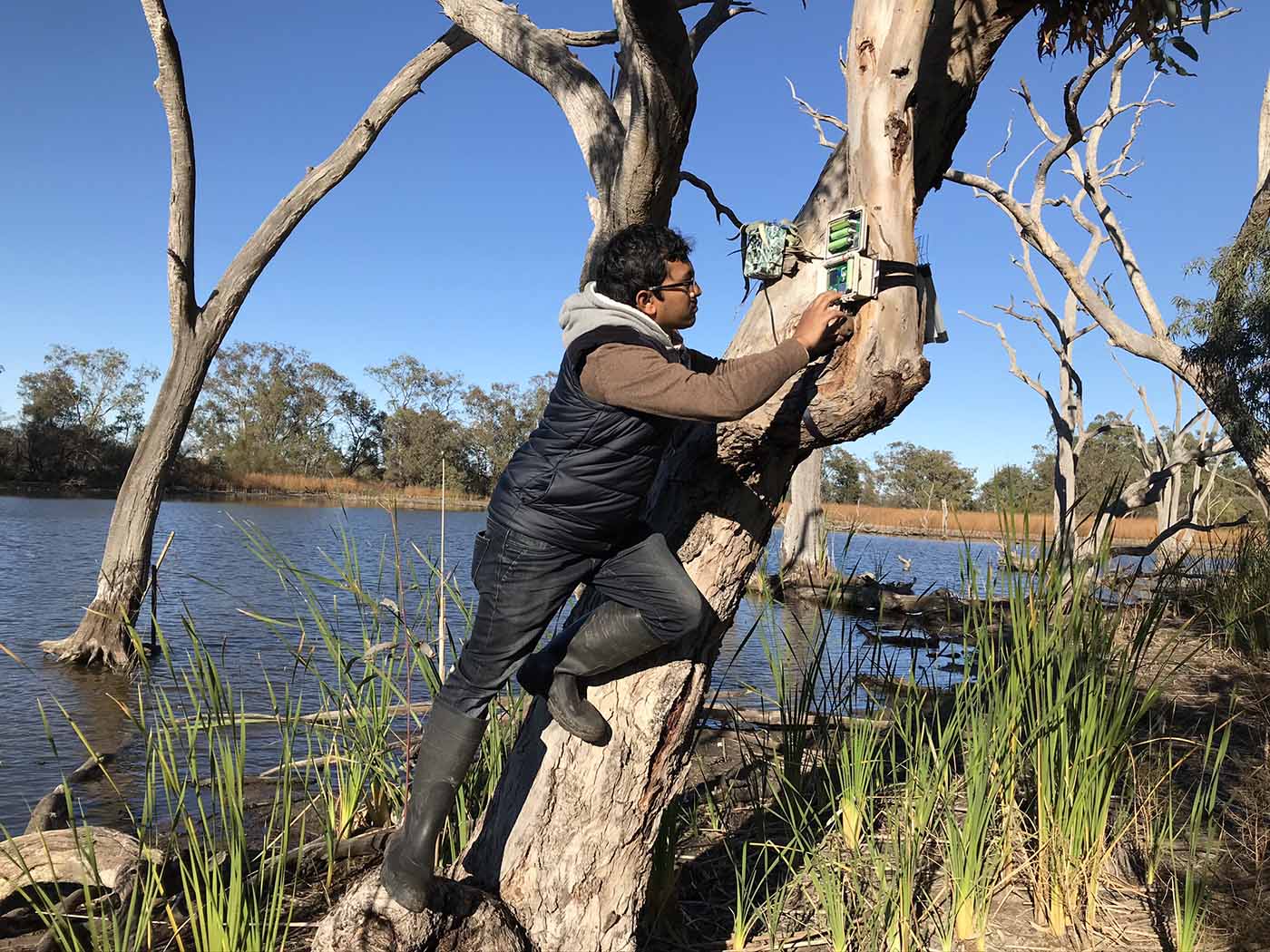
I recently completed my Master’s from the University of New England in New South Wales, Australia. I studied how frogs occurring in the floodplain wetland habitats respond to river flow, and investigated how methods of monitoring frog populations on a long-term basis in remote areas can be optimized. My broader interest is to understand how species such as amphibians are adapting and evolving to environmental changes, and otherwise contribute to amphibian conservation efforts. I completed a Bachelor’s degree with major in Zoology and a Master’s in wildlife biology from the University of Dhaka in Bangladesh.
Margot Fass
A Frog House
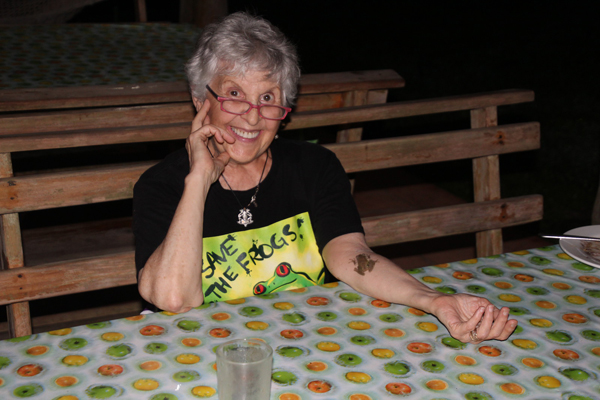
A Frog House founder, Margot Fass, is an activist, artist, author, educator, presenter and psychiatrist. Endangered species, especially frogs, are her passion. Her deep awareness and celebration of the cycles of life, the planet, and its organisms, are reflected in writings about wetland adventures in south and central American countries; her whimsical illustrated children’s book, Froggy Family’s First Frolic; and in her many paintings of frogs seen regionally. Euphoric for frogs, Margot and her infectious enthusiasm touch children and adults through presentations in schools and organizations, and in every opportunity for public presence. Her lively frog clothes, hat to socks, belie her sophisticated activism, and she works with local politicians and governments in the protection of wetlands and prevention of destructive development. Under her leadership, A Frog House has engaged hundreds of regional supporters to help implement significant protection of upstate New York’s environment. She hopes her work will bring joy, healing and raise consciousness about the preciousness of each unique life.
Luis Castillo
Denver Zoological Foundation
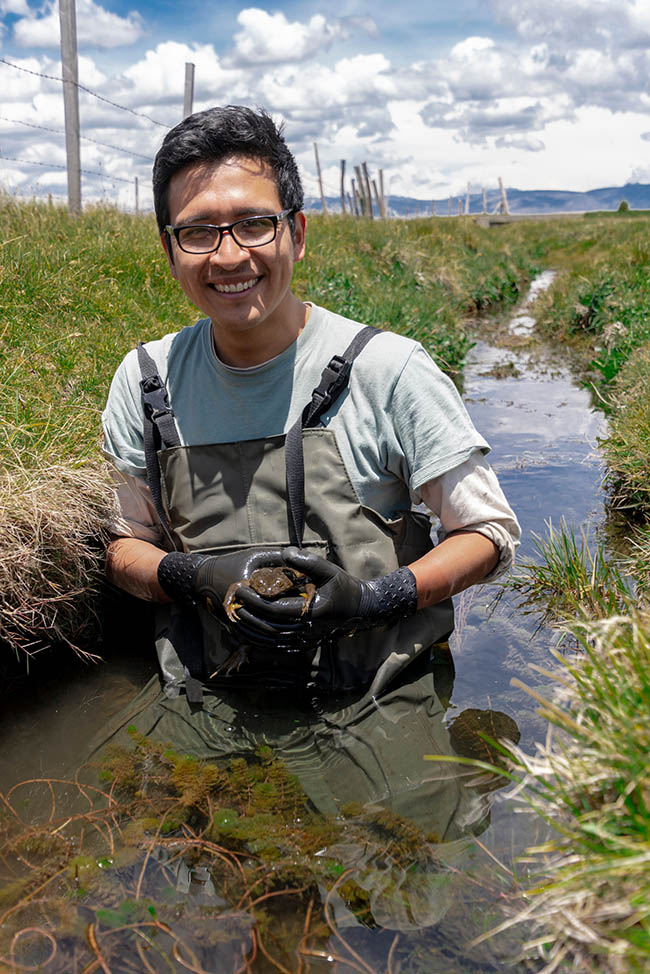
Luis Castillo Roque, biologist with experience in conservation of high Andean aquatic amphibians, graduated from the master’s degree in biodiversity and ecosystem management at National University of San Marcos. Co-founder of the NGO GRUPO RANA, project coordinator for the Denver Zoological Foundation. 2021 winner of the Carlos Ponce del Prado Peruvian award, and considered a future leader for amphibian conservation 2018 by Amphibian Survival Alliance.
Andrie Bon Flores
Mindanao State University – Iligan Institute of Technology
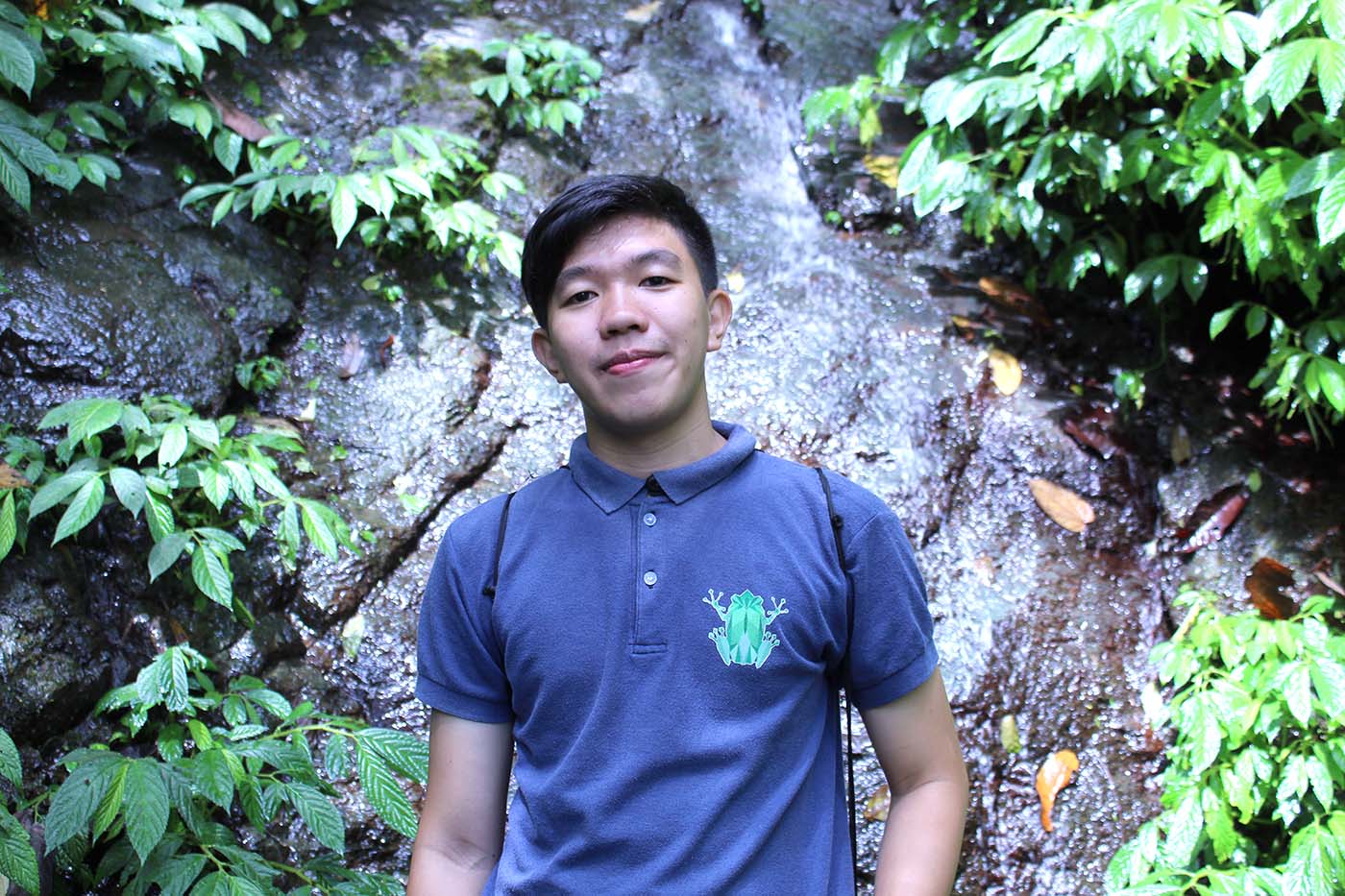
Andrie Bon Flores is an early-career conservation biologist and ecologist. He is currently taking his Master of Science in Biology at Mindanao State University-Iligan Institute of Technology under the Department of Science and Technology (DOST) Scholarship in the Philippines. Andrie is studying the life history of the Philippine endemic frogs and its relation to their external environment. He is also interested in Conservation Biology, Herpetology, Wildlife Studies, Chronobiology, Molecular Biology and Evolutionary Biology.
Andrie finished his Bachelor of Science degree in Biology majoring in Ecology at the University of Southern Mindanao where he was awarded the Most Outstanding Student Researcher in Ecology and 3rd Best Poster and Paper Presenter in the College In-House Review. He has presented numerous herpetofauna research studies at National and International scientific conferences, including the Association of Systematic Biologists of the Philippines’ Symposium and Annual Meeting; the Philippine Biodiversity Symposium and Society for Conservation Biology’s International Congress for Conservation Biology. He is a member of numerous organizations that aim to promote environmental conservation. On December 2018, he was granted a SAVE THE FROGS! Scholarship to assist with his burning passion for frog conservation.
Dr. Krishan Kumar Sharma
Frogman & The LoveByrds
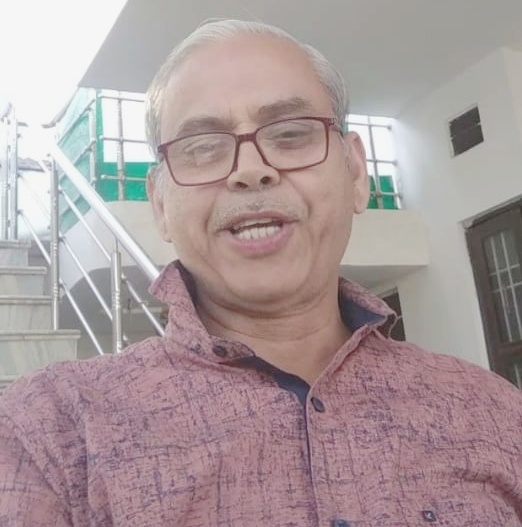
1. Involved in conservation of frogs since 1977. Helped discontinue their dissection in schools and colleges nationwide and implement the learning of anatomy and physiology of frogs using digital alternatives.
2. Developed small frog ponds to allow tadpoles to metamorphose and attain froglets and toadlets and to release them in nature to increase population of frogs and toads.
3. Organized many seminars, rallies, quizzes, frog games, banners and signs to allow frogs to cross roads in the last more than two decades.
4. Worked with SAVE THE FROGS! Founder Dr. Kerry Kriger for international level awareness activities.
5. Served as President of SAVE THE FROGS! India for about three years
Steve Andrews
The Bard Of Ely
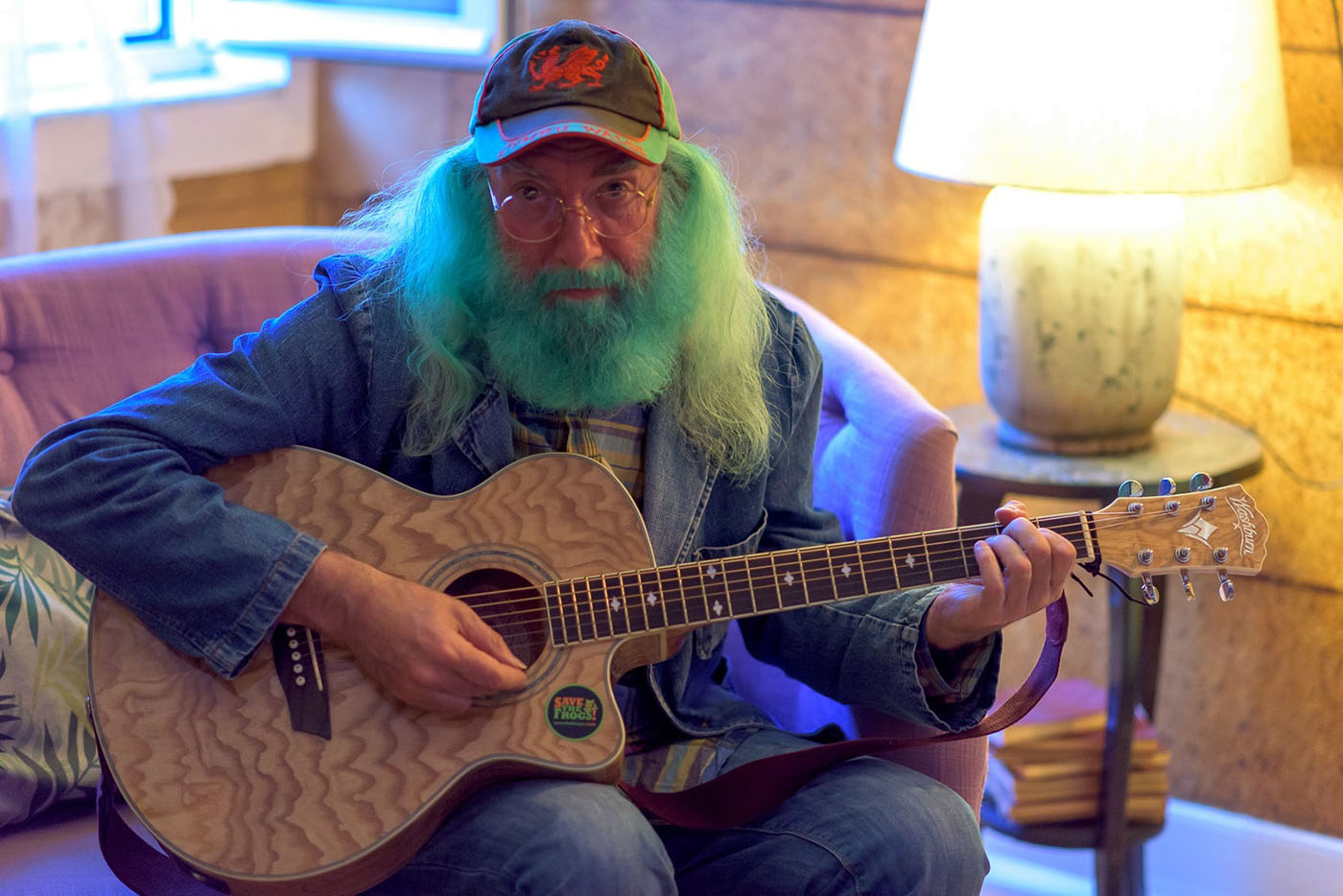
I am a naturalist, author, writer, poet and singer-songwriter. I have given talks about nature, and written many published articles in newspapers, magazines and online. I have a degree in Journalism, Film and Broadcast. I performed at Save The Frogs Day 2021, and am excited to be part of the World Summit.
Paul Morton
Bug Belly Books
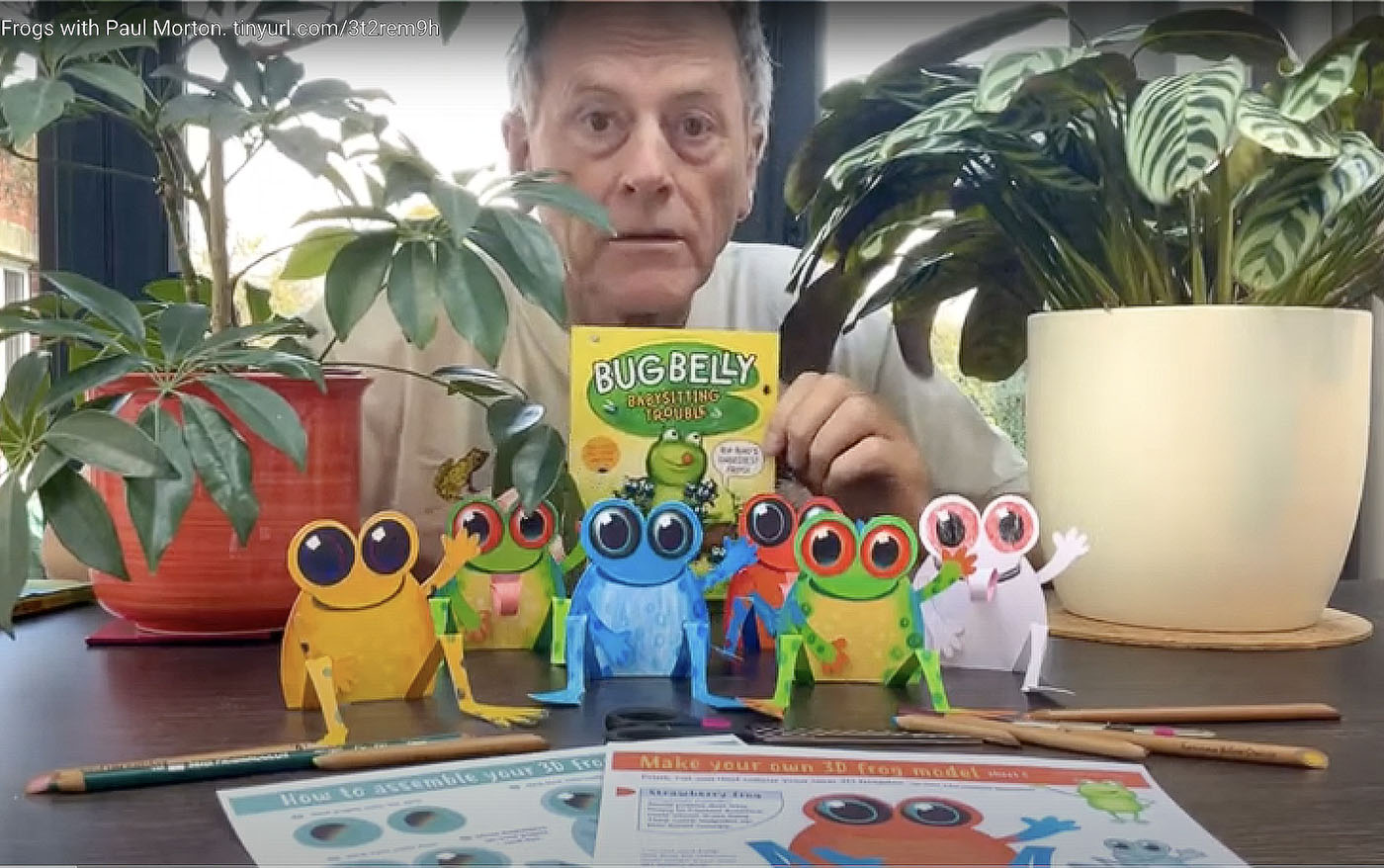
I’m a professional illustrator and author based in the UK with a life long love of frogs. I’ve worked on numerous frog themed projects over the years and my first two illustrated children’s books (pub. 2020 & 2021) feature Bug Belly the Hungry Frog.
I have been a member of the British Herpetological Society.
Learn About Past World Summits
SAVE THE FROGS! World Summit Photo Gallery
SAVE THE FROGS!
World Summit
By The Numbers
21 Speakers From 11 Countries
World Summit speakers represented 11 countries: Argentina, Australia, Canada, Costa Rica, Ghana, India, México, Nepal, Peru, United Kingdom and the USA.
11+ Hours Of presentations
Over eleven hours of amphibious education were delivered over the course of the event.
Zero Waste
No miles were travelled to organize this event and no flights were taken. No conference halls were paid for and no software was purchased. No staff or event planning firms were hired and no materials were printed.
Zero Funding
No grants or sponsorships funded this event, though we do thank all SAVE THE FROGS! donors and members whose ongoing contributions make events like the World Summit possible without external assistance.
Zero Ticket Sales
The SAVE THE FROGS! World Summit Online 2020 and all preceding World Summits have been completely free to attend.
515 Participants from 39 Countries
Participants hailed from Argentina, Australia, Bangladesh, Bolivia, Brazil, Canada, Chile, Colombia, Costa Rica, Czech Republic, Denmark, Dominican Republic, Ecuador, Estonia, France, Germany, Ghana, Guatemala, India, Italy, Mexico, Nepal, Nigeria, Pakistan, Panama, Paraguay, Peru, Philippines, Portugal, Russia, Singapore, South Africa, Spain, Switzerland, Tunisia, Uganda, United Kingdom, USA and Venezuela.
